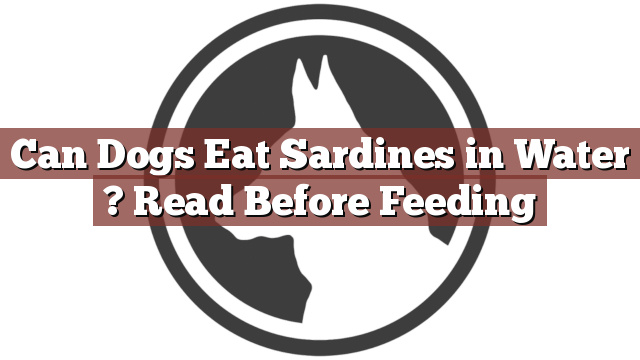Understanding Your Dog’s Dietary Needs
As a responsible dog owner, it is essential to understand your furry friend’s dietary needs. Dogs are omnivores, meaning they can eat both meat and plant-based foods. However, their nutritional requirements primarily revolve around high-quality protein sources, fats, and carbohydrates. While commercial dog food is formulated to meet these needs, many pet owners look for alternative treats or additions to their dog’s diet. One popular choice is sardines in water, but can dogs eat them?
Can Dogs Eat Sardines in Water? Read Before Feeding
Now, let’s address the burning question: can dogs eat sardines in water? The answer is a resounding yes! Sardines are safe for dogs to consume and can provide numerous health benefits. Rich in omega-3 fatty acids, calcium, and vitamin D, sardines can support your dog’s overall well-being. Omega-3 fatty acids, in particular, aid in reducing inflammation, promoting a healthy coat, and supporting brain function. Additionally, the high protein content of sardines can aid in muscle development and maintenance.
While sardines in water are generally safe for dogs, it is crucial to take certain precautions. Be sure to choose sardines packed in water rather than oil or with added seasonings. Added oils can be high in fat and might upset your dog’s stomach. Furthermore, always check for any bones or small pieces of fish that could pose a choking hazard. It’s also important to introduce new foods gradually and in moderation to avoid any digestive issues.
Pros and Cons of Feeding Sardines in Water to Dogs
Feeding sardines in water to your dog has several benefits. As mentioned earlier, the omega-3 fatty acids found in sardines can contribute to a shiny coat, reduced inflammation, and improved brain health. Additionally, the high protein content aids in muscle development and can be especially beneficial for active or aging dogs. Sardines are also a natural source of calcium and vitamin D, promoting healthy bones and teeth.
However, it’s important to note that sardines in water should not replace a balanced diet. While they offer many nutritional benefits, they should be given as an occasional treat or addition to your dog’s regular meals. Also, it’s advisable to consult with your veterinarian before introducing sardines or any new food to your dog’s diet. They can provide specific guidance based on your dog’s individual needs and help ensure a well-rounded diet.
In Conclusion: The Impact of Feeding Sardines in Water to Dogs
In conclusion, when it comes to the question, "Can dogs eat sardines in water?" the answer is a confident yes. Sardines can be a healthy and nutritious addition to your dog’s diet. Packed with omega-3 fatty acids, protein, calcium, and vitamin D, they offer several health benefits. However, it’s essential to choose sardines packed in water, check for bones or small pieces, and introduce them gradually and in moderation. Remember, sardines should not replace a balanced diet, so consult with your veterinarian before making any significant changes to your dog’s food routine. With proper precautions, sardines can be a tasty treat that contributes to your dog’s well-being.
Thank you for taking the time to read through our exploration of [page_title]. As every dog lover knows, our furry friends have unique dietary needs and responses, often varying from one canine to another. This is why it's paramount to approach any changes in their diet with caution and knowledge.
Before introducing any new treats or making alterations to your dog's diet based on our insights, it's crucial to consult with a veterinarian about [page_title]. Their expertise ensures that the choices you make are well-suited to your particular pet's health and well-being.
Even seemingly harmless foods can sometimes lead to allergic reactions or digestive issues, which is why monitoring your dog after introducing any new food item is essential.
The content provided here on [page_title] is crafted with care, thorough research, and a genuine love for dogs. Nevertheless, it serves as a general guideline and should not be considered a substitute for professional veterinary advice.
Always prioritize the expert insights of your veterinarian, and remember that the health and happiness of your furry companion come first.
May your journey with your pet continue to be filled with joy, love, and safe culinary adventures. Happy reading, and even happier snacking for your canine friend!

